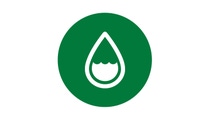Dispersions & Resins
Benefits of water-based technology for flexible packaging
Lower CO2 footprint
Did you know that water-based technology has been proven to reduce carbon emissions?
Water-based inks are the more sustainable alternative: they reduce the carbon footprint and environmental impact of your flexible packaging. This was shown in a series of BASF eco-efficiency analyses, which follow the high standards of ISO 14040/44 for life cycle assessments and ISO 14045 for Eco-Efficiency assessments. If you want to lower the carbon footprint of your flexible packaging even further, there are additional options like using biobased or biomass balanced raw materials.

Excellent print quality
Did you know that today’s water-based inks are performing on the same level as solvent-based inks?
Today the print quality of prints made with WB inks can match the ones printed with SB inks. This is the result of a combination of improved resin technology (new insights and use of new raw materials), formulation knowledge (adhesion promotion, use of optimal additive package), innovations in machine design (mainly drying capacity) and printing process (speed, increased viscosity stability of ink).

Low (or no) VOC (Volatile Organic Compounds)
Did you know that water-based inks are beneficial to worker‘s health and safety and offer regulatory advantages?

Cost analysis
Did you know that when a water-based system is used, the cost related to pollution emission is decreased?
From an environmental point of view, the VOC emission of water-based ink is much lower compared to solvent-based ink. That is why the cost related to emission of pollutants is lower. Examples are the cost of pollution emission permits, the cost per unit of pollution emission and the cost of waste management such as the CTO (catalytic thermal oxidizer) required for burning the VOCs so that the harmful particles are decomposed.
From a safety point of view, the cost of solvent-based ink storage is higher than water-based ink, as it is more flammable and therefore more susceptible to fire and explosion. The safer water-based ink is invaluable when it comes to prevention of work environment hazard.

Longer in-can ink stability/viscosity stability
Did you know that during a long print run the viscosity stability of water-based inks on the press is very good and no additions are needed?
When using solvent-based inks the organic solvents evaporate fast and thus lead to viscosity increase, which will require solvent addition/dilution during the print run. This is not the case when using water-based inks.

Increased life of printing plates
Did you know that water-based inks are the most friendly solution for your printing plates?
Regular printing inks for flexible packaging are mostly solvent-based and several types of solvents are used. Some of these solvents can cause swelling of the printing plates during the printing process, resulting in disappointing printing qualities. When using water-based inks you are not confronted with this issue: deformation of the printing plates does not take place and you can use your plates longer while printing at a higher quality.

Reduced costs for insurance and safety measures
Did you know that with water-based technology, there are very low or no flammable volatile organic compounds (VOC) in the ink production and printing process?

